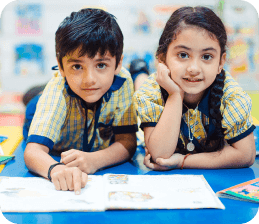Learning should be engaging, fun, and effective in the early years of a child’s life. Play-based learning has emerged as one of the most effective approaches to early childhood education, and at Junior Pathshala, this method is embraced to its fullest potential. This approach encourages children to learn and grow through play, fostering creativity, critical thinking, and problem-solving skills in a natural, enjoyable way.
What is Play-Based Learning?
Play-based learning is an educational approach where children engage in structured or unstructured play to explore, experiment, and learn new concepts. Unlike traditional education, which often focuses on rote memorization and repetitive exercises, play-based learning emphasizes hands-on experiences and imaginative play to develop cognitive, social, and emotional skills.
At Junior Pathshala, play is not just an activity but the foundation of the learning process. Through play, children are exposed to various concepts, ideas, and skills in a way that aligns with their natural curiosity and desire to explore the world around them.
How Play-Based Learning Benefits Young Minds
Encourages Creativity and Imagination
Play-based learning allows children to use their imagination to explore different scenarios and problem-solving techniques. Whether pretending to be a doctor, a chef, or a scientist, their imagination is nurtured, leading to enhanced creativity and the ability to think outside the box.
Develops Critical Thinking and Problem-Solving Skills
Through play, children are encouraged to think critically and make decisions. For instance, when they engage in a puzzle or build a structure with blocks, they learn to evaluate options, troubleshoot problems, and devise solutions. These skills are essential for cognitive development and academic success later in life.
Fosters Social and Emotional Development
Social skills such as sharing, communication, and collaboration are learned through group play. Children interact with their peers, practicing turn-taking, negotiating, and resolving conflicts in a supportive environment. Additionally, emotional intelligence is nurtured as children learn to express themselves, recognize emotions, and develop empathy toward others.
Promotes Physical Development
Active play is a significant part of early childhood development. Running, jumping, or climbing promotes physical coordination, motor skills, and overall health. These bodily experiences are integrated into play-based learning, ensuring children grow strong and healthy while engaging in educational activities.
The Role of Junior Pathshala in Play-Based Learning
At Junior Pathshala, play-based learning is not just a methodology but a core value. The learning environment supports and encourages free play while guiding children through structured activities that promote development in critical areas.
The educators at Junior Pathshala create immersive, play-based experiences that allow children to explore different learning zones. These include:
- Creative Arts: Children engage in activities like painting, crafting, and music, which enhance their innovative thinking and motor skills.
- STEM Activities: Interactive science experiments and building tasks stimulate curiosity about the natural world and develop early problem-solving skills.
- Role Play: Children are encouraged to play different roles, from chefs to doctors, which helps them understand other perspectives and improve their communication skills.
In addition to these activities, Junior Pathshala’s classrooms are designed to be safe, stimulating, and filled with materials that inspire exploration. By balancing guided learning and independent play, children can discover and learn at their own pace.
Play-Based Learning at Junior Pathshala: A Holistic Approach
One of the unique aspects of Junior Pathshala’s approach is the holistic development of the child. Play-based learning is used to foster not only academic growth but also emotional well-being, social skills, and physical health. This well-rounded approach ensures that children are prepared for future academic challenges while being supported in their personal growth.
Furthermore, this method aligns with the child’s natural development, making learning more enjoyable and less stressful. When children enjoy what they do, they are more likely to retain the information and skills they have acquired.
Conclusion: Start Your Child’s Journey with Play-Based Learning at Junior Pathshala
The power of play-based learning cannot be overstated, and at Junior Pathshala, it is used to unlock a world of possibilities for young minds. Children are encouraged to explore, experiment, and engage in activities that prepare them for future academic success and help them develop into well-rounded, confident individuals.
If you want an educational experience that nurtures your child’s natural curiosity and creativity. Junior Pathshala’s play-based learning approach is the ideal foundation. Visit Junior Pathshala today and give your child the gift of learning through play.

